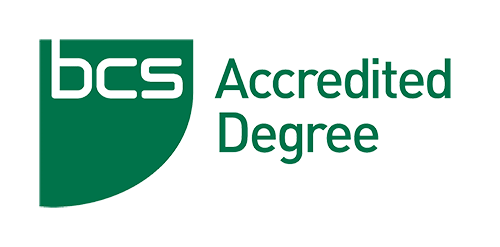Computing, BSc Hons
Our computing degree covers essential theory and practice but also provides the option to specialise in network or information systems if it suits your future career plans.
This computing degree covers subjects such as hardware and software types, digital media and business-oriented computing.
Our flexible course allows you to take a specialist pathway in network systems or information systems and shape your study to match your career plans. You'll be in an excellent position to advance into more specialised fields with this solid background in computing.
Popular career options for our computing graduates include software development, IT support and consultancy.
This course is accredited by BCS, The Chartered Institute for IT for the purposes of fully meeting the academic requirement for registration as a Chartered IT Professional.
UCAS points
104 (full requirements below)
Course/institution codes
G404 G BSc/CSN
Interested in a different year?
Select your preferred
to view up to date information.
Location
Duration
- 3 years full-time
- 6 years part-time
- 4 years sandwich
Start month
September
Home* /international fees 2025/26
£9,535 /£17,500
What you should know about this course
* The Department for Education has indicated that it intends to raise the Home tuition fee limit from £9,250 to £9,535 for 2025/26.
What you will study
About the course team
This degree course employs a range of innovative teaching and learning methods. Lectures and labs/tutorials are dynamic and interactive. You will be taught by an experienced team of lecturers, which includes senior academics, technical officers, and practitioners with industry experience. Our research and consultancy work informs academics, and over 90 per cent of our lecturers hold a teaching qualification.
Come and meet us
We are offering virtual events so that you can still experience how Greenwich could be the right university for you.
Next Open Days
Got a question?
To find out more about our Open Days and Campus Tours or if you need any assistance, please email opendays@gre.ac.uk.
Entry requirements
- 104 UCAS Tariff points. We accept A Levels, T Levels, BTECs, Access to HE and all other qualifications with UCAS Tariff points.
We make Contextual offers to this programme. Applicants that meet specific eligibility criteria will be made a contextual offer with a reduced tariff of up to 16 UCAS Tariff points. Other entry requirements such as GCSEs, Interview, etc., will still need to be met. For further information, please see our Contextual Admissions policy.
For more information, use our contact form or call us on 020 8331 9000.
You can also read our admissions policy.
For more information, use our contact form or call us on 020 8331 9000.
You can also read our admissions policy.
Available to overseas students?
Yes
Can I use Prior Learning?
For entry: applicants with professional qualifications and/or four years of full-time work experience will be considered on an individual basis.
For exemption: If you hold qualifications or courses from another higher education institution, these may exempt you from courses of this degree.
How you will learn
Teaching
Learning takes place through a combination of timetabled learning and independent study.
You can view more information about how each module is taught within our 'What you will study' section.
Seminars and workshops enable you to discuss and develop your understanding of topics covered in lectures in smaller groups. You will also be able to meet your personal tutor. Timetabled learning may fall between 9am and 9pm depending on your courses and tutorials.
Class sizes
The typical student intake per year averages 50-100. Lectures are normally attended by larger groups, and seminars or tutorials by smaller groups. Numbers can vary more widely for modules that are shared between degrees.
Independent learning
Outside of timetabled sessions, you are also expected to dedicate time to self-study. This may involve further reading and research, preparing coursework and presentations, and preparing for tests and exams.
You can use our Stockwell Street library and online resources to support you in these activities.
In addition, during the week you can also:
- Attend additional support classes in some modules
- Attend guest lectures from industry experts
- Take part in employability and enterprise workshops
- Join student societies.
Overall workload
If you are studying full-time, you should expect the workload to be similar to a full-time job. For part-time students, this will reduce in proportion with the number of courses you are studying.
Each module you study towards this degree is worth 15 or 30 credits. These represent around 150 or 300 study hours respectively. If you receive 72 contact hours for a 30-credit module, you should expect to commit 228 hours to independent study to complete it successfully.
Assessment
You can view how each module is assessed within our 'What you will study' section.
Each course has formal assessments which count towards your grade. Some courses may also include 'practice' assignments, which help you monitor progress and do not count towards your final grade.
Feedback summary
We aim to give feedback on assignments within 15 working days.
Dates and timetables
The academic year runs from September to June.
Full teaching timetables are not usually available until term has started. For any queries, please use our contact form.
Official statistics on Discover Uni
Full time
Part time
Fees and funding
Tuition fees
| Cohort | Full time | Part time | Distance learning |
|---|---|---|---|
| Home* | £9,535 | £2,384 per 30 credits | N/A |
| International | £17,500 | £4,375 per 30 credits | N/A |
University is a great investment in your future. English-domiciled graduate annual salaries were £10,500 more than non-graduates in 2023 - and the UK Government projects that 88% of new jobs by 2035 will be at graduate level.
(Source: DfE Graduate labour market statistics: 2023/DfE Labour market and skills projections: 2020 to 2035).
* The Department for Education has indicated that it intends to raise the Home tuition fee limit from £9,250 to £9,535 for 2025/26.
Home tuition fee limits: Find out more
Other costs
If there are any field trips, students may need to pay their own travel costs.
Scholarships and bursaries
We offer a wide range of financial help including scholarships and bursaries.
The Greenwich Bursary
This bursary is worth £700 for new undergraduate students with a low household income, entering Year 0 or 1 who meet the eligibility criteria.
EU Bursary
Following the UK's departure from the European Union, we are supporting new EU students by offering a substantial fee-reduction for studying.
Financial support
We want your time at university to be enjoyable, rewarding, and free of unnecessary stress, so planning your finances before you come to university can help to reduce financial concerns. We can offer advice on living costs and budgeting, as well as on awards, allowances and loans.
Careers and placements
Will I have a work placement?
This course can be taken in sandwich mode, which means you can take a year to work in industry between your second and final years of study. Sandwich placements are relevant to your degree subject and are paid roles. It is the very best way of preparing you for successfully finding a job quickly when you graduate.
For those students who are interested in pursuing a career in teaching you also have the option to select a module for which you will be required to undertake a short-term placement in a school or college.
How long is my placement?
Sandwich placements last for between 9-13 months. Work-based learning module placements are normally one day a week for either one or two terms depending on the number of credits available from the module.
What are the financial arrangements?
Sandwich placements are paid roles whereas work-based learning module placements are normally unpaid.
What sort of careers do graduates pursue?
Former students have secured placement years at Kent Connects, Oracle, and the European Bank for Reconstruction & Development.
Career opportunities exist in many computing areas such as IT support, consultancy, internet and e-commerce applications.
Graduates can expect to work as independent consultants or in teams with other computer professionals to build and support modern computing systems.
Are internships available?
Students are encouraged to take up Summer internships during the Summer holidays, though it is up to the student to find them. Support is available to students from the Employability and Careers Service when applying for placements and internships.
Do you provide employability services?
Employability activities take place all the time at Greenwich and students are encouraged to take part in as many opportunities as possible. The central Employability and Careers Service provides support for students preparing to apply for placements and graduate roles, such as CV clinics, mock interviews and employability skills workshops. In addition, your School has a dedicated Employability Officer who will be organising work-related activities throughout the year which will help you to build you industry knowledge and networks.
Accommodation
Greenwich
Living in halls of residence is a great way to make new friends and get into the social side of university life. With four great locations, all minutes away from the campus and the centre of historic Greenwich , you will be at the heart of one of the most beautiful university settings in the UK.
Rooms start at £146.30/wk and include Wi-Fi, utility bills, access to our on-campus gym and 24-hour security - and just a 10-minute train journey to central London. Students based at our Greenwich campus can also choose to live the Student Village at Avery Hill, which is only a short ride on our free shuttle bus.
Support and advice
Academic skills and study support
We want you to make the most of your time with us. You can access study skills support through your tutor, our subject librarians, and our online academic skills centre.
Where appropriate, we provide support in academic English and mathematics. If you need to use particular IT packages for a specific module, we provide training for this.
Do you provide employability services?
Employability activities take place all the time at Greenwich and students are encouraged to take part in as many opportunities as possible. The central Employability and Careers Service provides support for students preparing to apply for placements and graduate roles, such as CV clinics, mock interviews and employability skills workshops. In addition, your School has a dedicated Employability Officer who will be organising work-related activities throughout the year which will help you to build you industry knowledge and networks.
Not quite what you were looking for?
We've got plenty of other courses for you to choose from. Browse our undergraduate courses or check our related courses below.....
Computer science at the University of Greenwich
Discover the possibilities of technology at Greenwich, where courses shape students from undergraduate to postgraduate levels. Covering some of the most relevant industry topics, such as cybersecurity and artificial intelligence.
Visit our computer science degrees page.
Computer science degrees
Mode of study
Select from the dropdown below.
| Course level | |
| UCAS code | |
| Duration | |
| Location |










